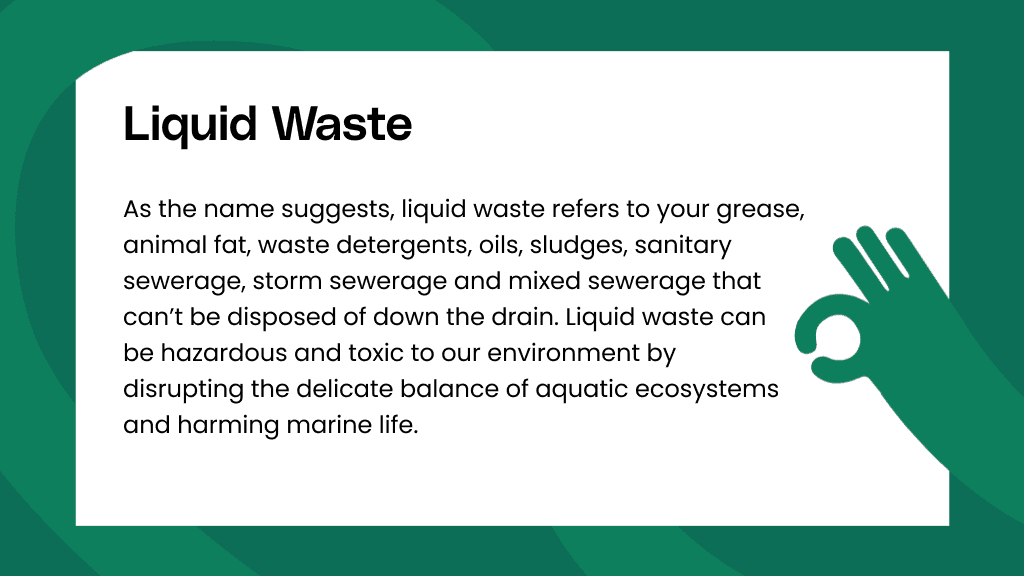The Only Guide to Reclaim Waste
The Only Guide to Reclaim Waste
Blog Article
Getting My Reclaim Waste To Work
Table of ContentsGetting My Reclaim Waste To WorkThe Best Guide To Reclaim WasteReclaim Waste Can Be Fun For AnyoneThe Ultimate Guide To Reclaim WasteReclaim Waste for Dummies
Check out the types, events, and types of liquid waste. Residential sewage waste refers to the waste and items from a household sewage-disposal tank. This sort of waste is produced by human beings in homes, schools, and other structures. This only includes sewage-disposal tanks that have a drain field. The proper management and disposal of residential sewage waste require liquid waste to be moved to a sewage treatment plant where the correct methods and devices are related to purify and dispose of waste.
Business waste typically includes possible dangers, such as combustible products or a mixture of liquid and strong waste products, and requires an extra advanced and in-depth disposal procedure. The disposal of industrial waste commonly includes the filtering of waste prior to transport to make certain risk-free and appropriate disposal. Hazardous waste is produced from by-products and overflow of commercial procedures and production.
This kind of waste can not utilize the exact same sewer administration transportation or procedures as septic or commercial liquids. The hazardous waste administration procedure requires the assessment and testing of liquid waste prior to it undertakes the disposal procedure (industrial wastewater treatment). Overflow waste is the fluid waste that comes from runoff and excess stormwater in very booming areas or cities
Drainage waste can trigger contamination and flooding otherwise managed appropriately. Find out more concerning sewer cleansing and waste monitoring. Making certain correct waste administration can avoid calamities and decrease environmental damage. Both individuals in domestic setups and professionals in business or production industries can gain from understanding the processes and regulations of fluid waste administration.
Excitement About Reclaim Waste
Call PROS Providers today to learn more about our waste monitoring and disposal services and the proper ways to care for the liquid waste you generate.
(https://gravatar.com/maximum5d830db060)This supposed 'wastewater' is not just an essential source yet, after therapy, will be released to our land, waterways or the sea. Utilized water from bathrooms, showers, baths, kitchen sinks, laundries and commercial processes is recognized as wastewater.

water used to cool machinery or tidy plant and equipment). Stormwater, a type of wastewater, is overflow that moves from agricultural and metropolitan locations such as roofing systems, parks, gardens, roadways, courses and gutters right into stormwater drains pipes, after rain. Stormwater moves without treatment straight to local creeks or rivers, ultimately reaching the sea.
How Reclaim Waste can Save You Time, Stress, and Money.
In Queensland, a lot of wastewater is treated at sewage treatment plants. Wastewater is moved from domestic or industrial sites via a system of drains and pump terminals, understood as sewerage reticulation, to a sewage treatment plant.
The Division of Natural Resources encourages local federal governments about handling, operating and keeping sewage systems and therapy plants. In unsewered locations, neighborhood governments may call here for homeowners to mount private or household sewage therapy systems to treat residential wastewater from bathrooms, cooking areas, washrooms and laundries. The Department of Natural Resources authorises making use of home systems when they are shown to be efficient.
Many stormwater receives no therapy. In some brand-new subdivisions, treatment of some stormwater to get rid of litter, sand and crushed rock has started utilizing gross toxin catches. Wastewater therapy takes place in 4 phases: Eliminates solid matter. Larger solids, such as plastics and other items wrongly released to drains, are gotten rid of when wastewater is passed via displays.
Wastewater then streams right into big tanks where solids work out and are eliminated as sludge. Grease and scum are skimmed from the surface. Makes use of tiny living microorganisms called micro-organisms to damage down and remove remaining dissolved wastes and fine fragments. Micro-organisms and wastes are included in the sludge. Gets rid of nitrogen and phosphorus nutrients that could cause algal flowers in our rivers and threaten marine life.
An Unbiased View of Reclaim Waste
Nutrient removal is not available at all sewage therapy plants since it needs expensive specialised equipment. It is becoming extra common in Queensland. Clear fluid effluent generated after treatment may still consist of disease-causing micro-organisms. If this effluent is launched into rivers such as rivers or the sea, the micro-organisms will at some point pass away out.

This usually indicates wastewater has to be treated or pollutants eliminated before it can be released to rivers. Most wastewater streams right into the sewage system. Under the Act, regional governments provide authorizations and permits for eco appropriate tasks (Ages) involving wastewater launches that could have a regional impact. The department carries out approvals and permits to ERAs involving wastewater launches that may have a local or statewide effect.
The Ultimate Guide To Reclaim Waste
Surveillance offers factual details about water top quality and can verify that licence conditions are being met. The details obtained via surveillance offers the basis for making water top quality decisions.
Report this page